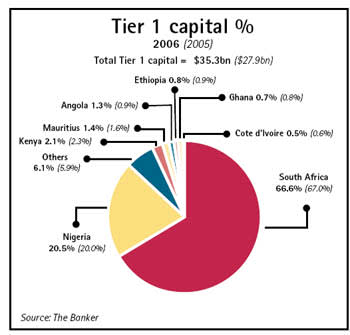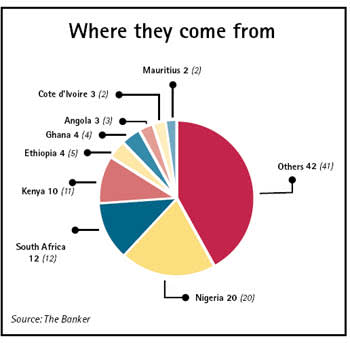On the surface, nothing much appears to have changed at the top of The Banker’s listing of the Top 100 Sub-Saharan African Banks, with the South African banks continuing to dominate with a 66.6% share of the aggregate Top 100 Tier 1 capital, 78.2% of aggregate assets and 71% of aggregate profit.
The top five places continue to be occupied by banks from South Africa but the sixth ranked bank in the Republic, African Bank, continues to lose ground (from 10th to 12th) as the effects of the Nigerian banks increased capitalisation wash through. Nineteen of the 20 Nigerian banks that feature in our listing are in the top 30. Togo’s Ecobank Transnational has moved up to 10th place from 11th last year following a 57.1% uplift in capital through share placements and loan-to-share conversion as it seeks to establish itself as a pan-African player rather than a regional one and to increase its retail banking scale.
Standard Bank, which tops the list, has continued to look to increase its footprint in the region through acquisition, the latest being those of CFC Bank in Kenya and IBTC Chartered Bank in Nigeria, each of which will be merged with the Standard Bank subsidiary in the respective country. Outside of Africa its focus has been on investment banking, with operations in the UK, the US, Brazil, Russia, Turkey and Asia but this year it has moved into commercial/retail banking in Argentina with the acquisition of BankBoston Argentina, now Standard Bank Argentina. It is an interesting market in which to take such a first step.
Chinese connection
Standard Bank was itself the subject of significant investment in late October, with the announcement of a strategic partnership with the Industrial and Commercial Bank of China (ICBC), under which ICBC will acquire a 20% share in the group through an equity investment of R36.7bn ($5.5bn). This will give ICBC customers doing business across Africa, of which there are an increasing number, access to an established banking network.
The aggregate Tier 1 capital for the Top 100 rose this year by 26.5% to $32.3bn, while aggregate assets grew 21.9% to $507.8bn and aggregate pre-tax profits increased 28% to $11.9bn. The Nigerian banks share of aggregate Tier 1 capital grew only 0.5% this year to 20.5%, while the share of aggregate assets rose to 11.1% from 8.4% and their share of aggregate pre-tax profits increased to 11.7% from 9.5%.
With an estimated 90% of Nigeria’s population unbanked, there is great scope for the provision of suitable banking services and the commensurate rewards for providing the same. Banks in Nigeria are continuing to increase their capitalisation by market placements in a buoyant market for bank shares partly to finance business expansion but also to act as a buffer against further increases by the regulator in the minimum capital requirement.
There remains the feeling that the much-reduced number of banks is still too many, and while the Standard Bank acquisition will reduce the numbers by one and possibly the discussions between First Bank of Nigeria and Ecobank Nigeria may lead to another disappearing, another round of consolidation may not be far off.
Once again this year 31 banks in the Top 100 are owned by banks from outside the region although this number may well fall if plans to bring Barclays’ African operations outside South Africa into the ABSA Group come into being.













